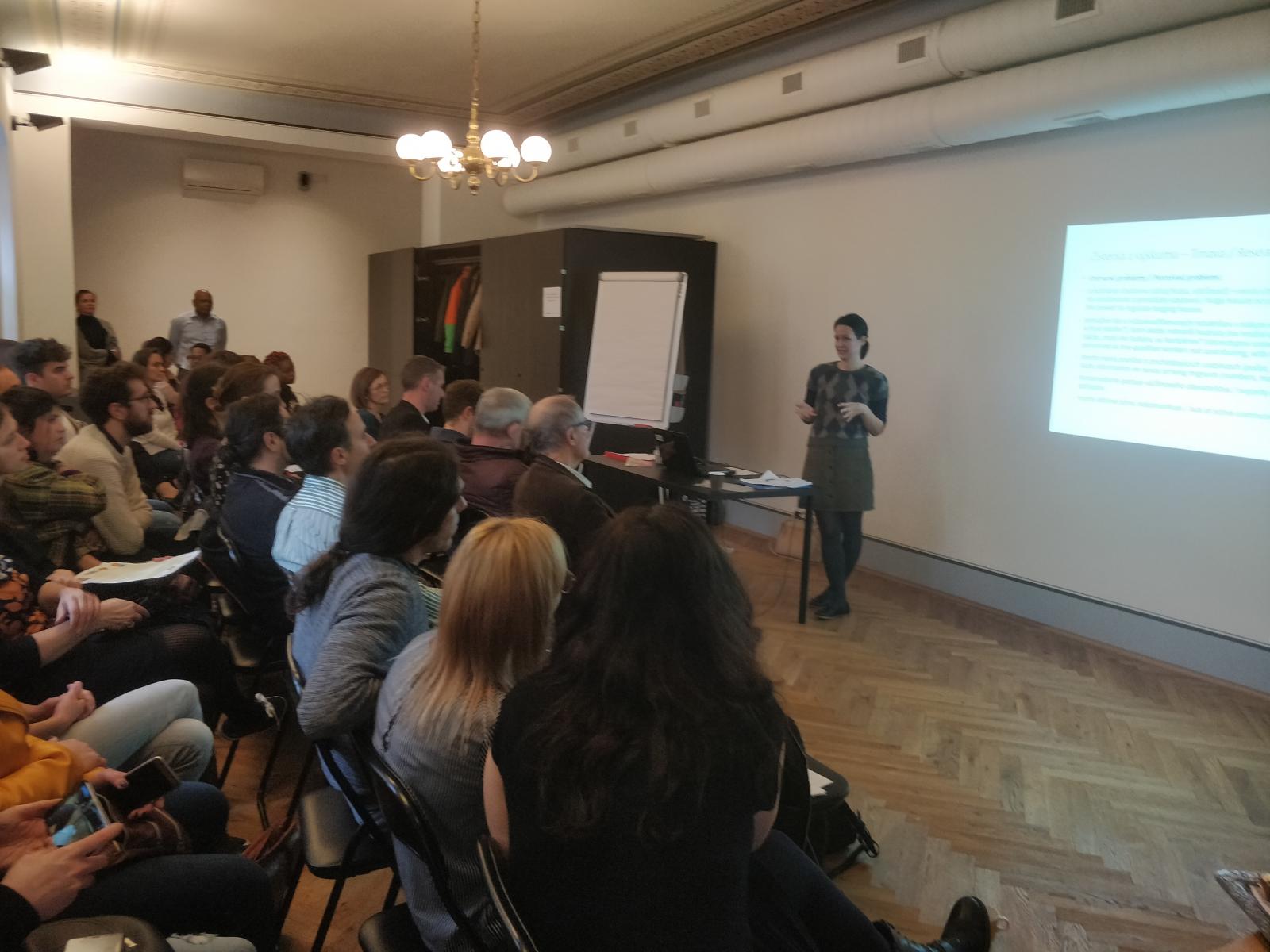SUMMARY
On May 6th, the Human Rights League, Marginal NGO, CVEK, and Milan Simecka Foundation, organized in the project KapaCITY, held the first discussion with foreigners in the city of Trnava. The discussion has been co-organized with City of Trnava, whose employees Ms. Jana Žišková and Ms. Monika Trubanová participated to the meeting.
Approximately, between 35 to 40 people participated in this first effort to connect the foreigners and learn more about their experiences of integration to that city.

The meeting started with a research presentation on the situation of migration and integration in Trnava, followed by a presentation on the rights and duties of the municipality (both Trnava region and Trnava City). Then, a questionnaire was distributed among participants to obtain relevant feedback on the general integration of foreigners to the city and to collect contact information for future project activities. The meeting concluded with a Q&A session where most of the participant’s inquiries were sorted and explained in detail.
QUESTIONNAIRES ON FOREIGNERS’ INTEGRATION IN TRNAVA –
PROS AND CONS TO LIVE IN THE CITY OF TRNAVA
By circulating the questionnaire on integration during the meeting, we were able to collect pertinent information based on foreigners' actual experience. While not everyone had a chance to finish the questionnaire during the event, and as we continue to gather more answers to draw legitimate conclusions, below are some preliminary findings intended to illustrate how foreigners feel about their integration in the city.
The meeting gathered an interesting mix of fairly new arrivals with long-lived, and presumably integrated, individuals. Almost half of our attendees, who filled out the questionnaire, have lived in Trnava for more than eight years, but others have arrived in the city within the last two years.
When it comes to pros, most people found positive the size and the quietness of the city. Also, the majority of the foreigners living in the city, who took this survey, found that Trnava's geographical location was convenient since it is close to Bratislava and Vienna’s airport.
The responses suggest that the greatest challenges in Trnava for foreigners are the language barrier and/or acquisition of Slovak language, and housing or flat availability. Other challenges include low local income, the difficulty of meeting new people, perceived racism at schools, the weather during the winter time, and last but not least important the difficulty of communicating with the police. These issues have been raised and highlighted during Q and A session as well.
CONCRETE STEPS FOR THE INTEGRATION OF FOREIGNERS
(Based on participants’ responses)
The final part of the training focused on questions by participants with the aim to draw some conclusions on which concrete steps for integration would be needed. In general, the participants feel that language is a great barrier to fully integrate into the city of Trnava, many expressed needed more information in English while they continue to learn the local language.
Also, more spaces for multicultural events like a language cafe between foreigners and locals. Some other suggested finding a way to ease the flat/housing arrangments in the city.
Finally, an online platform with guidelines for foreigners living in Trnava was presented.
Specific challenges and recommendations identified:
- Language – firstly, the issue of lack of available and accessible courses on Slovak language has been mentioned as pressing problem. The discussion followed on the possibility for the municipality to organize such courses.
- Secondly, participants raised the problem related to insufficient language acquisition courses for migrant children in schools. This has been identified as pressing issue with the role of the municipality being identified here as well.
- Qualifications. Participants complained about the lack of clear information on recognition of various diplomas, qualifications and lack of clear rules. This has been identified as issue for State authorities to solve.
- Extensive discussion has been held on the procedure on citizenship. Although the law prescribes the language exam and the exam about general knowledge of Slovakia, there are no text books, tests nor courses that would prepare an applicant for the examination. Also, no rule on recognition of Slovak language certificate or exam does exist. The participants concluded that is it necessary to have clear rules and clear information on the content and scope of both exams as current situation is very uncertain and vague.
- Another highlighted issue is related to the government run websites, which are not user friendly and frequently lack information in foreign (English) language. This makes it really hard for the foreigners living in Slovakia to navigate through the system.
- 6. Finally, website of Trnava City has been discussed. This website also does not contain information in English for inhabitants, only for tourists. It has been suggested to improve the situation and representatives of the city have been convinced that KapaCITY project could provide tools to solve these challenges.

Project KapaCITY - local support of integration of foreigners is co-financed by European Union, Asylum, Migration and Integration Fund, Internal Affairs Funds.
